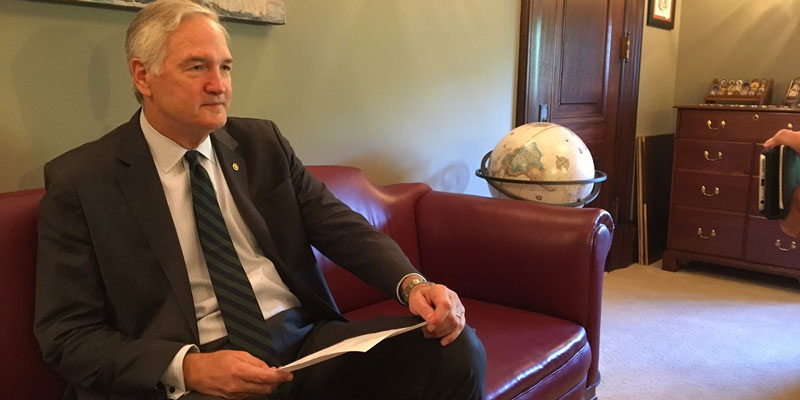
During a sermon on loving our neighbors this Sunday, my pastor asked our congregation to imagine we had been proven right, once and for all, about something. We had been vindicated in our beliefs, we were the clear victors. The “other side” had lost.
The grace with which we treat the “losers,” we were reminded, is the true measure of our victory.
We’re not only called to love those with whom we agree, but instead all of those who are in need of love, which is indeed all of us. If in our “winning” we espouse hate and alienate others, we have in fact sacrificed that very mission we are called to fulfill, all in the name of personal vindication.
Or, as legendary Alabama coach Paul “Bear” Bryant put it, “It’s awfully important to win with humility. It’s also important to lose. I hate to lose worse than anyone, but if you never lose you won’t know how to act. If you lose with humility, then you can come back.”
Whether you believe proponents of gay marriage are the “winners” today or not, the amount of vitriol being spewed undermines the messages of both sides of the debate.
On Friday, AL.com columnist Kyle Whitmire, boasting he would “burn for this,” published an article using examples—all derived from the Old Testament and many showing a total lack of understanding of the cited passages—of marriage in the Bible that are far from what modern Christians would consider traditional marriage, in an attempt to prove a point that all depictions of biblical marriage should be thrown out of society today.
Whitmire closes out his column by quoting 1st Corinthians 13:4-7 as the inspiration for his understanding of how we should view Christianity and the same-sex marriage debate.
“Love is patient and kind; love does not envy or boast; it is not arrogant or rude. It does not insist on its own way; it is not irritable or resentful; it does not rejoice at wrongdoing, but rejoices with the truth. Love bears all things, believes all things, hopes all things, endures all things.”
Sunday, Whitmire published another column, accompanied by a poll so wildly offensive it was taken down Monday morning, asking if Roy Moore’s vocal opposition to same-sex marriage is an overcompensation for the fact that he is actually “a gay” himself.
Apparently lost on Whitmire was the irony of a pro-gay marriage activist deciding the worst thing he could say about Moore was that he might be gay.
But there has to be a better way than name-calling and middle-school comebacks.
In the last two weeks, we have heard very few reasoned, love-centered contributions to the same-sex marriage debate. Columns like Whitmire’s do nothing but stoke the fires of hate and vitriol, instead of breeding respect and understanding like so many proponents of marriage equality profess to desire.
I found the scripture reading for yesterday’s sermon to be particularly prescient for the debate currently raging in courtrooms and churches, and on Facebook and editorial pages.
“Do not repay anyone evil for evil. Be careful to do what is right in the eyes of everyone. If it is possible, as far as it depends on you, live at peace with everyone. Do not take revenge, my dear friends, but leave room for God’s wrath, for it is written: “It is mine to avenge; I will repay,” says the Lord. On the contrary:
“If your enemy is hungry, feed him;
if he is thirsty, give him something to drink.
In doing this, you will heap burning coals on his head.”
Do not be overcome by evil, but overcome evil with good.”
-Romans 12:17-21
No matter your opinion on this (or any controversial) issue, it’s important to remember your real priorities; if embodying what you believe is more important than being on the “winning” side, if treating people how you want to be treated really matters. We can disagree, we can be angry, we can approach life from completely different paradigms, but at the end of the day we have to live with one another, so we might as well do it civilly.
Like this article? Hate it? Follow me and let me know how you feel on Twitter!
— Elizabeth BeShears (@LizEBeesh) January 21, 2015










